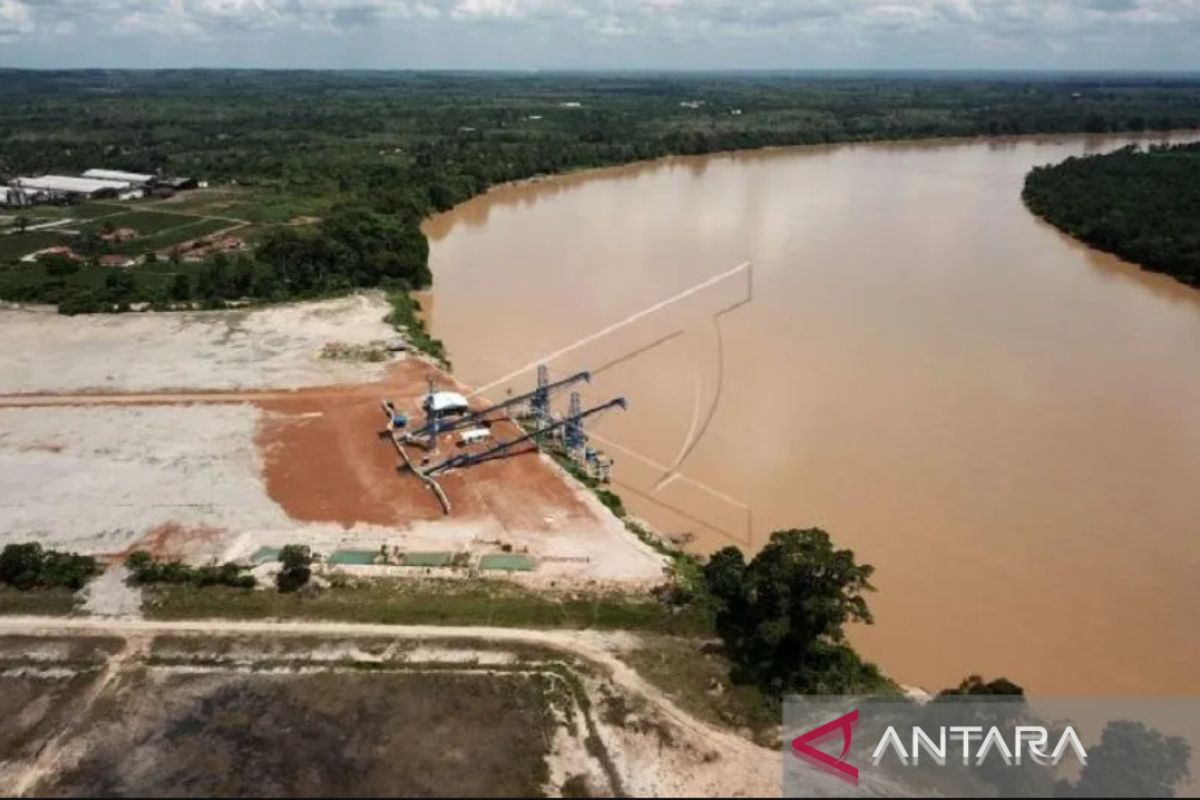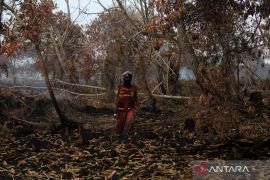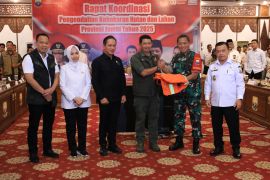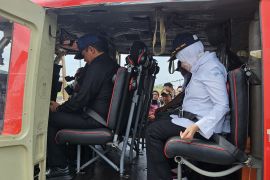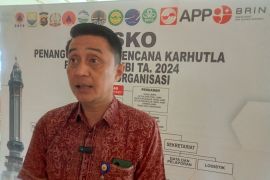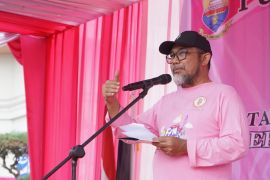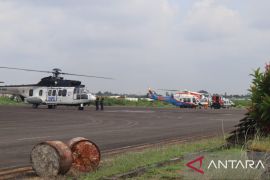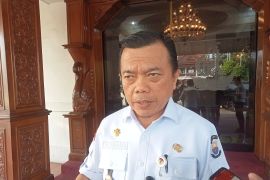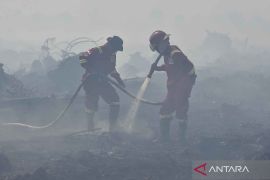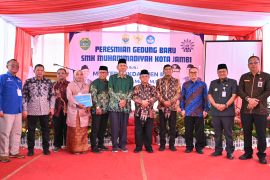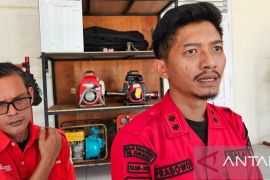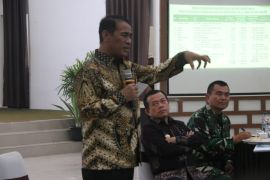The 800-kilometer-long Batanghari River that crosses several districts in Jambi Province, such as Batanghari, Bungo, Tebo, Muaro Jambi, and Tanjung Jabung Timur, as well as Jambi City until it empties into the Malacca Strait, is the undeniable solid culture of the Ancient Malay civilization.
The river, which once became a cradle of ancient civilization in the era of 7-13 AD, has now changed into a big trash can for the disposal of liquid waste from rubber, palm oil, and mercury factories that are sourced from illegal gold mining, hotels, and other industries. Solid waste contamination or waste from households, markets, agriculture, and shops also ended up in that river.
This situation affects the decline in fish catches of fishermen in the Batanghari River Watershed. Prior to 2015, fishermen were able to catch around 20-50 kilograms of fish using only traditional nets installed along the river banks.
However, currently, the bells tied to the nets, as a sign of the presence of fish, are no longer ringing. Most catches in a day are only three to four kilograms.
Even the fishermen's income, which was originally around Rp3 million for single fishing, was drastically reduced since the catch did not sell out in the market, as the taste of the fish was no longer as good as it used to be.
"Some people poison fish using electric shocks. My parents used to catch fish by only using a net on the river bank. Now, fishermen have to go fishing, but it is also difficult,” Sabli, one of the fishermen in Batanghari River, stated.
The river's water surface also took on a different color to appear dark brown which the local residents believe is due to river degradation caused by abrasion in the upstream.
Moreover, during the rainy season, several areas along the river were affected by the overflowing water. On October 3, 2017, people in Teluk Low Village, Tebo Ilir Sub-District, complained of itching, especially children.
The Rapid Response Team (TRC) of the Regional Disaster Mitigation Agency (BPBD) of Batanghari District, Jambi Province, reported a critical flood situation if the water discharge of the Batanghari River was at Alert II status, with an increase in water level of six centimeters, from the threshold of 330 centimeters.
If the water discharge continues to increase, then the status of Batanghari River can increase to Alert I or disaster status, when the water level reaches 351 centimeters.
The rise in the water level of Batanghari River resulted in the sub-districts of Maro Sebo Ulu, Muara Tembes, and Muara Bulian becoming flooded.
Clean Batanghari Program
Jambi Governor Al Haris confirmed that water pollution in the Batanghari River was inching closer to the maximum threshold for drinking water production quality standards for more than two million customers in the local area.
Contamination of harmful substances in the Batanghari River currently reaches 49.9 percent of the Regional Drinking Water Company's (PDAM's) water production quality standard of a maximum of 51 percent.
The pollution is influenced by several findings, including illegal mining and the impact of forest logging from palm oil and rubber plantation activities in the upper reaches of the river.
The waste resulting from these activities was dragged by the Batanghari River flow to damage the surrounding ecosystem.
"If we look for them (illegal loggers), (then) they will automatically disappear," Haris noted.
The Jambi provincial government has actually mapped the points of forest destruction around the riverbanks and has reported their activities to the central government as the operational control holder of the forest police.
To overcome the problem, the Jambi Provincial Government has launched the Clean Batanghari Program in a bid to normalize river flow through the involvement of community leaders along with the local and central governments.
The activity was conducted by inviting all local governments along the river to contribute to cleaning the river through community involvement with the support of local regulations to the customary law.
Swarnabhumi Celebration
The Directorate General of Culture of the Ministry of Education, Culture, Research, and Technology (Kemendikbudristek) along with several local governments officially opened the Swarnabhumi Celebration (Swarnabhumi Kenduri) as the realization of cultural advancement in accordance with the mandate of Law Number 5 of 2017, in Jambi, Friday, August 12.
Swarbahumi Celebration is an effort to reconnect, disseminate, and strengthen Malay culture with various activities in the region.
The regional government is optimistic that the event would bring a reminder to the aquatic culture along the Batanghari watershed as well as bring pride in the Batanghari River that has played a main role in the development of the civilization and a growing commitment to caring for the traditional and national cultural heritage.
Director of Film, Music, and Media of the Directorate General of Culture of the Ministry of Education and Culture, Ahmad Mahendra, said that Batanghari River was a source of life that connected people, who have lived along its path since a long time, thereby building a cultural tradition.
The Swarnabhumi Celebration event became a movement to connect the Malay aquatic community back to being part of the civilization that had started from the Batanghari watershed.
Miss Jambi 2022, Sindy Novela, said that the Swarnabhumi Celebration showcased an effort to build awareness of the importance of rivers in the development of civilization and community culture, especially in Jambi.
The Jambi resident, who is also active in environmental issues, supports Kenduri Swarnabhumi in providing benefits to the community in the Batanghari watershed covering seven districts in the provinces of Jambi and West Sumatra.
She also invited members of the young generation in Jambi to create programs that could increase understanding of the history and meaning of the Batanghari River for the betterment of society, culture, and environmental conservation.
The 2022 Swarnabhumi Celebration carries the main theme of "Batanghari River Civilization: Past, Present, and Future," with the narrative raised being Reconnecting Communities with River Civilization. The celebration will be held from August 12 and will end on September 22, 2022.
The event will involve communities focusing on cultural fields, such as archaeologists, researchers, historians, academics, humanists, and students.
Several activities held as part of the event were the Batanghari River cruising expedition, field school, restoration of the Muara Jambi national cultural heritage area, 14 regional festivals, seminars, and talks on Civilizations in the Batanghari Watershed.
Related news: Jambi's 16 villages swamped after Batanghari River overflows its bank
Related news: Flood sweeps through six villages in Jambi
Editor: Rahmad Nasution
Copyright © ANTARA 2022
